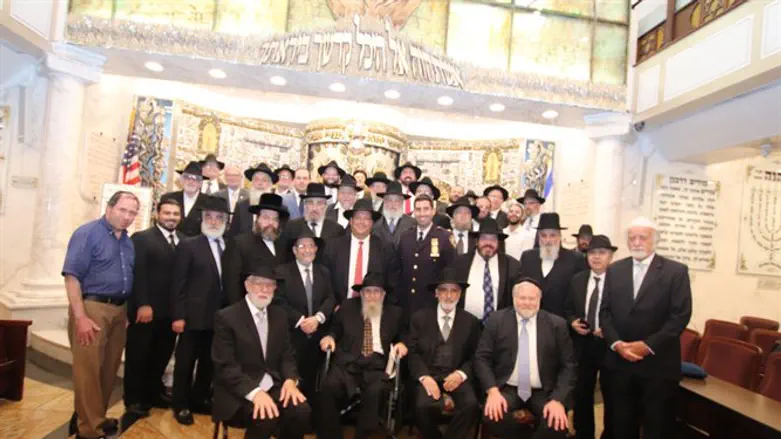
A new year is around the corner. Members of Klal Yisroel are pulling out all the stops to merit a Kesiva V’chasima Tova. Both at the individual and communal levels, there are so many berachos and yeshuos that are so badly needed. As always, Klal Yisroel looks towards its rabbanim for leadership, guidance, advocacy and chizuk.
In front of the ornate Aron Kodesh of the Sephardic Lebanese Congregation on Avenue T in Brooklyn, and later in the simcha hall downstairs, leaders of the Igud HaRabbanim/Rabbinical Alliance of America and other distinguished guests crystallized the calling of leadership in our day. This has been the Igud’s mission since 1942, when it was founded by gedolim such as Rav Yaakov Kamenetsky zt”l, Rav Gedaliah Schorr zt”l and Rav Shraga Feivel Mendlowitz zt”l, and later encouraged and guided by the Lubavitcher Rebbe zt”l & Rav Moshe Feinstein zt”l. The Igud currently has a growing network of nearly 1,000 diverse rabbanim across the country, as well as a Beth Din led by Rav Herschel Kurzrock, and a robust government advocacy operation.
For the 33rd consecutive year, the Igud held its flagship gathering on Chai Elul, the birthday of the Baal Shem Tov and Baal HaTanya. The annual gathering’s highlights include a Siyum HaShas (completion of the Talmud), cumulatively completed by the Igud’s rabbanim; and a convocation summing up the Igud mission for the year ahead.
Rabbi Mendy Mirocznik, Executive Vice-President of the Igud, emphasized the consistent and fearless leadership that the Igud’s rabbanim represent regardless of the issues of the day. “Rabbanim must often take unpopular positions,” he candidly explained. “The Igud provides the tools for them to succeed.”
The highlight of the multi-hour event was the Siyum HaShas. Rabbi Shaul Kassin, Chief Rabbi of the Syrian Community, made the Siyum on the entire Talmud. Rabbi Kassin explained that the Siyum symbolizes that the Igud’s rabbanim are not content merely with learning and leading the tzibbur around the clock. “The rabbanim show that they want to do ‘retzono shel makom,’ fulfill the divine will,” he exclaimed in an address replete with profound Talmudic insights. Rabbi Leibel Wulliger Rosh Kollel, Nachlas Dovid, of Yeshiva Torah Vodaath, made the Has’chala HaShas with an impassioned series of Talmudic interpretations.
At this rabbinic convocation, the RAA honored the following members of the NYPD: Hon. Dermot Shea, Police Commissioner of the City of New York received the Distinguished Guardianship Award; Chief Jeffrey Maddrey, Chief of Community Affairs, received the Exemplary Community Leadership Award; NYPD Chaplain Dr. Imam Tahir Kukiqi received the Exceptional Partnership Award; and NYPD Deputy Inspector Richard Taylor, Commanding Officer, Community Affairs Office of the Chief of Community Affairs, received the Outstanding Community Service Award.
The following dignitaries were in attendance: Assemblyman Simcha Eichenstein; Councilman Kalman Yeger; Pinny Ringel, representing Mayor Bill de Blasio; Simon Sebag, representing Public Advocate Jumanie Williams; Pinny Hikind, representing Comptroller Scott Stringer; Rabbi Eli Slavin and Gabriel Torres, representing Congresswoman Yvette Clark; District Leader and NYC Council Candidate Ari Kagan; and NYC Council Candidate Steve Saperstein, among other dignitaries that attended the event to discuss the concerns of Torah Jewry with the Igud. Additionally, Rabbi Nissim Zeev, founder of the Shas Party and former Member of the Knesset; Rabbi Aharon Zeev; Rabbi Yeruchim Silber, Agudath Israel’s Director of New York Government Relations; Rabbi Josh Mehlman, Chairman of the Flatbush Jewish Community Coalition; Rabbi Chanania Sperlin, Executive Vice-President of the Crown Heights Jewish Community Council; Rabbi Berish Frelich; Rabbi Zvi Berkowitz; Rabbi Shlomo Braun; Rabbi Avi Greenstein, CEO of the Borough Park Jewish Community Council; Rabbi David Heskiel, NYPD Clergy Liaison (CAB) Organizing Committee; Rabbi Chesky Blau; Rabbi Ari Weiss, Staten Island Shomrim; and Mark Meyer Appel, President and Founder of the Bridge Multi Cultural Project were in attendance. The following top brass of the NYPD were in attendance: Deputy Chief Joseph Gallucci, Inspector Marlon Larian and Inspector Max Talentino.
The Siyum HaShas and dinner was dedicated in memory of Rabbi Meir Shapiro, Chief Rabbi of Buenos Aires and Igud Chairman, and his Rebbetzin Pearl Yita Shapiro, by Rabbi Pinny Shapiro and family.
The event began with greetings by the host, Rabbi Eliyahu Elbaz the Mara D’atra of the Sephardic Lebanese Congregation, and an invocation by Rabbi Leonard (Yehuda) Blank, MS, BCC, Director of Programing, Chaplaincy Commission and External Affairs for the Igud, and former New York City Housing Authority Police Department Chaplain. Subsequently, Rabbi Michael Meir Melnicke, Chairman of the Board of Trustees, RAA/Igud and Chairman of the Siyum HaShas and Dinner presented awards to Commissioner Shea, Chief Maddrey, Chaplain Imam Dr. Tahir Kukiqi and Deputy Inspector Richard Taylor.
Commissioner Shea addressed head-on the startling rise in anti-Semitic hate crimes in New York. Commissioner Shea assured the rabbanim that the NYPD and its Hate Crimes apparatus are taking the issue seriously. “We are not going backwards as a city,” he said.
Rabbi Yehoshua Hecht, chairman of the Igud presidium, Rav of Congregation Beth Israel Chabad of Norwalk, CT, passionately articulated the Igud’s official convocation agenda for the coming year. Top agenda items include: lobbying for a mandated daily moment of silence, recognizing the Creator, in educational institutions across America; urging the Jewish Federation organizations to increase their support for Torah education; supporting the integrity of Israel’s Chief Rabbinate and its fealty to Halacha; and promoting awareness that the Igud is an authentic voice of American Jewry, whose Torah observant bloc is growing fast.
The event concluded with the climactic Siyum HaShas. This was the culmination of a year of learning of Igud’s rabbis, who divided the entire Talmud for individual study, and the beginning of a new period of study. Each new year has its own set of challenges but we constantly return to the Talmud for guidance. As the inspirational ceremonies concluded, the Igud’s rabbanim returned to their respective communities, with chizuk and a clear mandate for their avodas hakodesh in the year ahead.